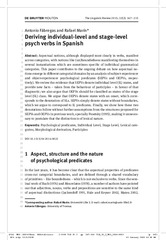Blar i forfatter Artikler, rapporter og annet (språk og kultur) "Marín, Rafael"
-
Datives and stativity in psych predicates
Fábregas, Antonio; Marín, Rafael (Chapter; Bokkapittel, 2020) -
Deriving individual-level and stage-level psych verbs in Spanish
Fabregas, Antonio; Marín, Rafael (Journal article; Tidsskriftartikkel; Peer reviewed, 2015-04-28)Aspectual notions, although displayed most clearly in verbs, manifest across categories, with notions like (un)boundedness manifesting themselves in several instantiations which are sometimes specific of individual grammatical categories. This paper contributes to the ongoing debate on how aspectual notions emerge in different categorial domains by an analysis of subject-experiencer and object-experiencer ... -
Events always take (place with) ser
Fábregas, Antonio; Marín, Rafael; Perpiñán, Sílvia (Journal article; Tidsskriftartikkel; Peer reviewed, 2023-02-21)The present study aims to throw light on the behavior of the Spanish copulas ser and estar in locative sentences, beyond their classical distinction in terms of Individual-Level (IL) versus Stage-Level (SL) predicates. The behavior of the Spanish copulas in locative contexts constitutes an oddity that we aim to probe here: events (concierto ‘concert’), despite their clear spatial and temporal ... -
Initiators, states and passives in Spanish psych verbs
Fábregas, Antonio; Marín, Rafael (Chapter; Bokkapittel, 2020-12-08)The goal here is twofold: the first one is to point out the existence of at least two classes of Object Experiencer psychological verbs (henceforth, OEPV) in Spanish with respect to their passive behavior, casting doubt on Landau (2010), who proposes that passivization of OEPVs correlates with the availability of pseudo-passives in a language. The second one is to argue that passives of OEPVs match ... -
The internal structure of perfective adjectives: states and blocking
Fábregas, Antonio; Marín, Rafael (Journal article; Tidsskriftartikkel; Peer reviewed, 2020-10-05)The goal of this article is to discuss the nature of so-called perfective adjectives in Spanish (desnudo ‘naked,’ suelto ‘loose’). We do so through a discussion of the problem that participles are blocked by perfective adjectives in some contexts (Dejó la habitación {limpia / ∗limpiada} ‘He left the room {clean / ∗cleaned}). We will argue that perfective adjectives contain in their internal structure ... -
Les noms d'état psychologique et leurs objets : étude d'une alternance sémantique
Fábregas, Antonio; Marín, Rafael; Barque, Lucie (Journal article; Tidsskriftartikkel; Peer reviewed, 2012) -
Problems and questions in derived adjectives
Fábregas, Antonio; Marín, Rafael (Journal article; Tidsskriftartikkel; Peer reviewed, 2017)This article overviews the main questions that emerge from cross-linguistic analysis of morphologically complex adjectives. It is discussed that the problems arise from the fact that it is difficult to identify any positive properties of adjectives capable of singling them out with respect to other categories. Thus, what has been classified as a derived adjective frequently is a version of the base ... -
The role of aktionsart in deverbal nouns: State nominalizations across languages
Fábregas, Antonio; Marín, Rafael (Journal article; Tidsskriftartikkel; Peer reviewed, 2012)Most of the literature devoted to the study of deverbal nominalizations concentrates on the complex event reading (La concentración de partículas tiene lugar a temperatura ambiente, ‘The concentration of particles takes place at room temperature’) and the object reading (El paciente tenía concentraciones de calcio en el hombro, ‘The patient had calcium concentrations in the shoulder’), while ...


 English
English norsk
norsk






